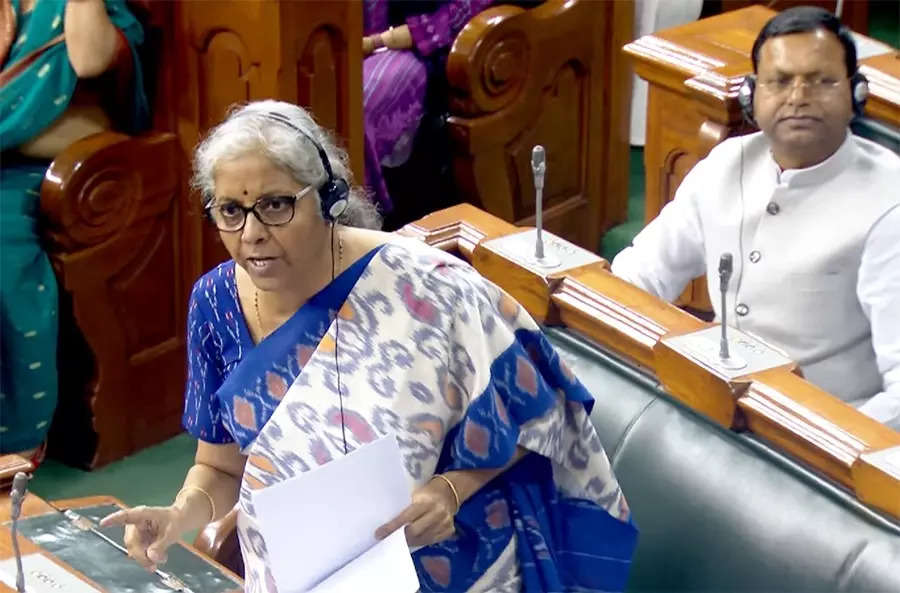Finance Bill: What you gain, where it pinches – Times of India
NEW DELHI: The Finance Bill, 2023, was passed without discussion in Lok Sabha on Friday with over 45 amendments amidst protest by opposition members for setting up a joint parliamentary committee (JPC) in the Adani-Hindenburg issue.
The Finance Bill, 2023, gives effect to the financial proposals of the central government for the financial year 2023-24.
Here are the key points in the bill:
Angel tax from April 1, 2023 (FY24)
The Income Tax (I-T) department seeks to tax any premium above fair value. So, valuations will need to be justified now. Draft rules in this regard are expected shortly.
Marginal relief to individuals opting for the new tax regime
It was earlier proposed that there would be no requirement to pay tax under the new regime for those earning up to Rs 7 lakh. But there was no marginal relief prescribed, which has been prescribed now to ensure that someone earning Rs 7,00,100 doesn’t end up with a liability of Rs 25,010.
LTCG benefits eliminated for majority of debt funds
Long-term capital gains benefits eliminated for a majority of debt funds (where not more than 35% of the proceeds are invested in equity shares of domestic companies). Currently, long-time unit holders pay capital gains tax of 20% with indexation or 10% without indexation. Now they will be taxed at the slab rate, which for many investors will be much higher.
It will also reduce the attractiveness of these schemes and provide a boost to other investment options such as bank Fixed Deposits.
Changes to LRS
Credit card payments for international tours will be part of the Liberalised Remittance Scheme (LRS), the RBI will look into such payments which escape tax collection at source, which is at 20%.
Withholding tax on royalty and fees for technical services hiked to 20%
Tax treaty benefits will become more critical now to avail of a reduced withholding tax rate. Most tax treaties have a rate lower than 20%. However, to claim tax treaty benefits, foreign entities (recipients of such income) will have to prove their tax residency and may have to show commercial substance of the transaction
It will likely increase the cost of import of technology in cases where Indian companies are grossing up withholding taxes and treaty benefits are not available.
Tax incentives for IFSC
Introduction of a beneficial withholding tax rate of 10% for dividends received by non-residents from IFSC units will help incentivise investment from non-residents.
Also, interest income on borrowing by foreign company from long-term bond or rupee-bond listed on IFSC bourse taxable at 9%.
TDS on online gaming apps advanced
The application of the TDS on online gaming apps will now be effective from April 1, instead of July 1, 2023, as proposed earlier.
(Source: Deloitte, AKM Global)
The Finance Bill, 2023, gives effect to the financial proposals of the central government for the financial year 2023-24.
Here are the key points in the bill:
Angel tax from April 1, 2023 (FY24)
The Income Tax (I-T) department seeks to tax any premium above fair value. So, valuations will need to be justified now. Draft rules in this regard are expected shortly.
Marginal relief to individuals opting for the new tax regime
It was earlier proposed that there would be no requirement to pay tax under the new regime for those earning up to Rs 7 lakh. But there was no marginal relief prescribed, which has been prescribed now to ensure that someone earning Rs 7,00,100 doesn’t end up with a liability of Rs 25,010.
LTCG benefits eliminated for majority of debt funds
Long-term capital gains benefits eliminated for a majority of debt funds (where not more than 35% of the proceeds are invested in equity shares of domestic companies). Currently, long-time unit holders pay capital gains tax of 20% with indexation or 10% without indexation. Now they will be taxed at the slab rate, which for many investors will be much higher.
It will also reduce the attractiveness of these schemes and provide a boost to other investment options such as bank Fixed Deposits.
Changes to LRS
Credit card payments for international tours will be part of the Liberalised Remittance Scheme (LRS), the RBI will look into such payments which escape tax collection at source, which is at 20%.
Withholding tax on royalty and fees for technical services hiked to 20%
Tax treaty benefits will become more critical now to avail of a reduced withholding tax rate. Most tax treaties have a rate lower than 20%. However, to claim tax treaty benefits, foreign entities (recipients of such income) will have to prove their tax residency and may have to show commercial substance of the transaction
It will likely increase the cost of import of technology in cases where Indian companies are grossing up withholding taxes and treaty benefits are not available.
Tax incentives for IFSC
Introduction of a beneficial withholding tax rate of 10% for dividends received by non-residents from IFSC units will help incentivise investment from non-residents.
Also, interest income on borrowing by foreign company from long-term bond or rupee-bond listed on IFSC bourse taxable at 9%.
TDS on online gaming apps advanced
The application of the TDS on online gaming apps will now be effective from April 1, instead of July 1, 2023, as proposed earlier.
(Source: Deloitte, AKM Global)
For all the latest business News Click Here
Denial of responsibility! TechAI is an automatic aggregator around the global media. All the content are available free on Internet. We have just arranged it in one platform for educational purpose only. In each content, the hyperlink to the primary source is specified. All trademarks belong to their rightful owners, all materials to their authors. If you are the owner of the content and do not want us to publish your materials on our website, please contact us by email – [email protected]. The content will be deleted within 24 hours.


